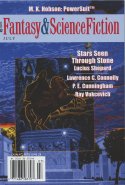
| Editor: | Gordon van Gelder |
| Issue: | Volume 113, No. 1 |
| ISSN: | 1095-8258 |
| Pages: | 162 |
July was a very good month for science fiction magazines this year. This was a solid episode anchored by a good, long novella by Lucius Shepard and without a bad story. The Charles de Lint book reviews weren't anything special, but Elizabeth Hand's excellent review of John Crowley's Ægypt series more than makes up for it.
"Daughters of Prime" by Lawrence C. Connolly: The alien first contact and anthropological parts of this story never clicked for me. I think there's some word and sound play with the language that went right over my head and the problem the aliens find themselves in seems a bit too stark. What makes the story is the interesting method of interstellar exploration that serves as the backdrop and the interplay between the viewpoint character and her other selves. I felt let down by the ending, but I liked the world construction. (6)
"Stars Seen Through Stone" by Lucius Shepard: This novella is the majority of the issue, a remarkable 76 pages. That's not quite up to a 1950s novel, but it's getting close. That's a risky move for an SF magazine since if someone doesn't like the novella, it sinks the whole issue, but this is a solid, enjoyable character-driven story dealing with the intrusion of the numinous and the horrific on everyday life.
The protagonist is a music producer specializing in unknown indy bands with potential. He's found an amazing musical talent who's also one of the most difficult human beings he's had to deal with. As he tries to build their career while putting up with odious personal habits, strange lights appear in the town and then the behavior of the inhabitants starts to slowly change. One of the strengths of the story is the subtlety of the changes and the way in which they weave into life, deftly calling reader assumptions into question. It's a mix of a UFO and a fairy story that's actually a story about people, and most remarkably, Shepard kept my attention through the long story even though I don't care about the music industry or the hobbies of the main characters. (7)
"Cold Comfort" by Ray Vukcevich: This short, funny story is a great take on the Turing Test. It's a surrealistic conversation with a refrigerator that calls a support line that had me grinning all the way through. And within the humor, it pokes at telling machines apart from people and poses the question of whether one truly cares. Not new material, but a fun presentation. (7)
"Car 17" by P.E. Cunningham: One great thing about this issue is that each story is sharply different from the others. This is more of a legend or a tall tale of a local police officer in a small town and his loyal car with a mind of its own. If, like me, you grew up watching Herbie the Love Bug movies, this will bring a smile to your face. It's a story of a man and his dog, except the dog is a car, which adds a new spin on a very old story. (7)
"PowerSuit TM" by M.K. Hobson: The issue concludes with a nice bit of humorous satire of personal assistants and smart programs. A PowerSuit is clothing, an AI, and a personal agent, gathering information, hacking into systems for its owner, offering advice, and helping the owner get just what they want. Marshall Graig has a very good one, one that's almost too intelligent, and one that Marshall argues with from time to time. He's in a corporate rivalry with his supposed boss, who rather than using a PowerSuit instead has personal enhancements and cybernetics, and he badly wants to show up his rival. Then everything goes haywire. There's a great twist ending and fun, lighthearted play with the idea of a personal AI that knows better than you what's good for you. (7)
Reviewed: 2007-09-14